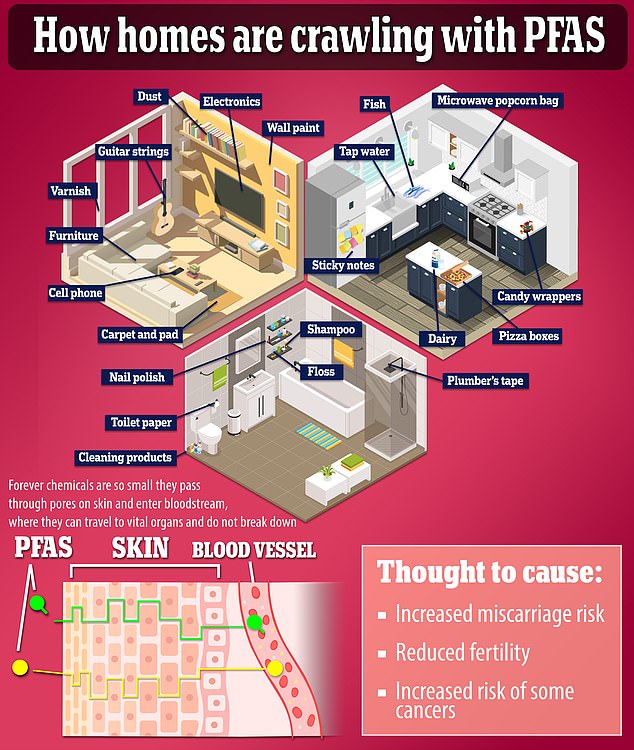The 12 Everyday Goods That Will Be Banned in One US State Due to Cancer-Causing Chemicals
Nearly a dozen everyday products could soon be banned under a new Minnesota law as the state tightens regulations on toxic chemicals that remain in the home permanently.
Starting in January 2025, a new law will go into effect that will ban the use of PFAS in 11 product categories in the North Star State, including carpets, dental floss, cosmetics, bedding and cookware.
Minnesota lawmakers have addressed PFAS before, passing a law this year that bans the substance from food packaging.
However, officials say more needs to be done to protect the health of residents in a state where high levels of PFAS have been found in water sources.
Under the new law, it is illegal to sell or distribute products from the 11 categories in the state of Minnesota
PFAS (per- and polyfluoroalkyl substances) are a group of thousands of substances known as forever chemicals.
They are microscopic compounds that take thousands of years to break down in the environment or the human body, hence their nickname.
There is no safe exposure threshold for PFAS. They have been linked to various forms of cancer, asthma, fertility problems, obesity, birth defects, diabetes and autism.
Minnesota Deputy Health Commissioner Wendy Underwood said, “Drinking water can be a source of exposure and there’s been a lot of news about this, but consumer products, particularly those that are resistant to grease or oil stains and water, can be an even greater source of exposure.”
In just four months, PFAS will no longer be allowed in carpets or rugs, cleaning products, cookware, cosmetics, fabric treatments, children’s products (such as cribs, booster seats and high chairs), menstrual products, textile products (such as curtains and bedding), ski wax, dental floss and upholstered furniture.
Under the new law, it is illegal to sell or distribute products from the 11 categories in the state of Minnesota.
The ban is an expansion of last year’s legislation called Amara’s Law, named after a 20-year-old who advocated for PFAS-free water and products after being diagnosed with a rare form of cancer.
The woman had lived in Minnesota her entire life and blamed her cancer diagnosis on exposure to PFAS. She died in 2023.
The Minnesota Pollution Control Agency is responsible for enforcing the ban.
According to MPCA Commissioner Katrina Kessler, the agency already has experience monitoring companies’ use of banned chemicals, such as lead and cadmium, in children’s products.
To enforce this ban, she said, the agency will purchase products suspected of containing the banned PFAS and test them for their presence.
If toxic substances are found in the products, the MPCA will impose fines and civil penalties on the manufacturing companies.

Ultimately, Minnesota lawmakers want to ban PFAS from all products by January 2032, unless a company can demonstrate there is no way to avoid using the chemicals.
Minnesota companies have four months to adapt their products, but some already have a head start.
Cookware brand Nordic Ware, based in St Louis Park, Minnesota, halted the use of PFAS in its cookware in June.
Jon Crawford, the company’s director of supply chain, said Nordic Ware wanted to get ahead of the state’s PFAS ban and sought replacements for the chemicals that are permanently in its products and prevent them from sticking.
Two other Minnesota companies — Faribault Mill, a textile company that makes bedding, and Sigma Beauty — say they have never used PFAS in their products.
The state of Minnesota recently settled a PFAS lawsuit with manufacturing giant 3M, based in Maplewood, Minnesota.
3M, which is credited with inventing non-stick chemicals, was sued by the state, which sought the cost of cleaning up groundwater contaminated with PFAS that officials say was spread through 3M landfills.
The parties reached an out-of-court settlement worth $850 million.
America began using PFAS in the 1940s in virtually every manufacturing sector – from food packaging to kitchenware to clothing.
Their main function is to repel water and oil, making non-stick pans easier to clean and some jackets and tents resistant to rain.
They are found in textiles, cookware, clothing, greaseproof food packaging and personal care products. The chemicals can easily enter the body after contact.
They can also end up in water through washing up and in food through packaging.
